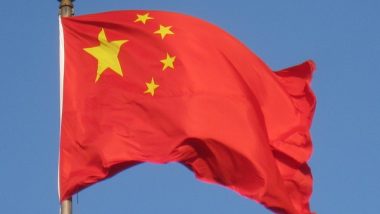Hong Kong, July 1: Germany's new China strategy has irritated Chinese leadership as Berlin has now been trying to diversify its economic relations away from China and towards 'democracies and partners with shared values', as the German Indo-Pacific guidelines indicate.
While Germany has been looking for an alternate or another trade partner, China warned that if Germany politicises trade issues, it will bring risks to economic ties with China, reported The HK Post. Also Read | China President Xi Jinping Officiates Swearing-In Ceremony of Hong Kong's New Leader John Lee.
The change in Berlin's relationship with Beijing became visible after Olaf Scholz took over as the new German Chancellor last year. Soon after he assumed office, the German government apparently decided to change its approach toward China.
China's obfuscation over Russia's actions in Ukraine, its zero-Covid strategy and its alleged persecution of the Uygur people in Xinjiang were compelling factors for Berlin to revise its policy on China, reported The HK Post.
As far as China is concerned it is said that if Germany allows itself to be involved in this anti-China political farce, only China-Germany relations and economic and trade cooperation will be damaged.
Germany and China have been trading partners since the latter started opening up its economy in the late 1970s. Berlin has always followed the mantra "change through trade", which also extended to Russia. Foreign affairs experts put the onus on China for forcing Germany to change its approach.
They said that China has been trying to leverage Germany's economic dependence in order to keep Germany out of any US coalitions against China. In fact, China has been using the dependence of the largest German automobile producers on the Chinese market to achieve favourable economic and political results, reported The HK Post.
The access of Huawei to the German market was one example. In December 2019, the Chinese ambassador to Berlin, Wu Ken, suggested that German automobile companies could be targeted by the Chinese authorities if Huawei were excluded from the German market.
Besides, China has also been trying to frighten Germany away from military engagement in the Indo-Pacific. More so, China has always stuck to its holy grail of territorial integrity and national sovereignty when it came to international relations.
Some German experts view that Germany was entering a new phase in which China was seen less as a partner and increasingly as a strategic competitor and rival Germany was also worried about the unprecedented growth of Chinese power combined with the challenge China's international strategy presents to the existing liberal international order, reported The HK Post.
As indicated by Norbert Rottgen, former Chair of the Bundestag Foreign Affairs Committee, the two states find themselves at odds over Hong Kong, Taiwan, and the South China Sea. Since the mid-2010s, the two states have become increasingly distant. Germany has been extremely cautious about economic cooperation with China.
Germany had joined the Asian Infrastructure Investment Bank, becoming its fourth-largest shareholder, but avoided joining the Belt and Road Initiative due to concerns over transparency, a level playing field for business and European labour, as well as environmental and social standards.
In the last two years, Germany has attempted to limit Chinese influence by increasing its own diplomatic engagement with Indo-Pacific states.
This has involved German politicians undertaking unprecedented levels of diplomatic activity in the Indo-Pacific region, meeting frequently with the leaders of other regional powers throughout 2020 and 2021.
Additionally, Germany has been becoming more politically engaged in the region. Also, it has increased its military presence albeit to a limited extent.
(The above story is verified and authored by ANI staff, ANI is South Asia's leading multimedia news agency with over 100 bureaus in India, South Asia and across the globe. ANI brings the latest news on Politics and Current Affairs in India & around the World, Sports, Health, Fitness, Entertainment, & News. The views appearing in the above post do not reflect the opinions of LatestLY)












 Quickly
Quickly


